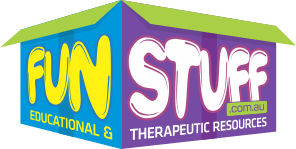Unlocking Potential: How to Teach Children with autism to Write with Joy and Creativity
Navigating the educational landscape when your child has Autism Spectrum Disorder (ASD) presents unique challenges and rewards. One particular area that parents and educators often find perplexing is understanding how to teach children with autism to write.
Writing, a complex skill that requires motor coordination, cognitive understanding and expressive creativity, can sometimes be an uphill task for children with ASD. However, with the right tools, strategies and support, it’s possible to turn this daunting task into an enjoyable learning journey.
Here at Fun Stuff, we’re dedicated to providing resources that make learning an engaging and enriching experience for children with autism.
- Tailoring the Approach: Understanding Your Child’s Needs
Every child on the autism spectrum has a unique set of strengths and challenges. Some might struggle with fine motor skills, making the physical act of writing difficult, while others might find organising their thoughts on paper challenging. Therefore, the first step in teaching children with autism to write is to assess their individual needs and learning styles. This personalised approach makes it easier to select the most suitable strategies, whether it’s strengthening hand muscles, using technology, or breaking down tasks into manageable parts.
- Sensory-Friendly Tools: Creating a Comfortable Writing Environment
Children with ASD often have sensory sensitivities – traditional pens, pencils, or paper textures might be uncomfortable for them, hindering their writing process. Fun Stuff recognises the importance of sensory-friendly resources and offers a variety of tools (like magnetic pads with stylus, double-sided sensory massage gloves, fidget cube rings and more) to enhance sensory input development. These aids are not only practical but also fun, making the act of writing more approachable and enjoyable.
- Visual Methods: Using Colour and Structure to Guide Writing
For many children with autism, visual cues are essential in learning. Products like our Sentence Shuffle Fun Deck utilise a colour-coding system that assists with sentence structure, sequencing, and logical reasoning. Incorporating these visual elements in teaching writing helps clarify abstract concepts. For instance, using graphic organisers can aid in planning essays or stories, allowing students to see connections between ideas.
- Technology Integration: Embracing Alternative Writing Forms
Sometimes, the barrier in learning how to write is the physical act itself – in such instances, technology can be a valuable ally. Speech-to-text programs and interactive writing apps can make the process less tedious and physically demanding. These digital tools encourage children to express their thoughts without being bogged down by the limitations of their motor skills.
- Encouraging Expression: Building Confidence and Creativity
A crucial aspect of teaching children with autism to write is fostering a love for self-expression – it’s important to celebrate their efforts, no matter how small. Toys and games that simulate real-life situations, such as “Hidden Rules: Friends”, can also be instrumental in helping them understand different contexts and expressing related thoughts more effectively. Creative prompts that align with their interests can also spur engagement, making writing a less strenuous task.
- Collaborative Learning: The Role of Expert-Guided Support
At Fun Stuff, we understand the importance of expert guidance in addressing developmental learning difficulties. Our resources are curated with insights from qualified speech pathologists, educators, psychologists, and occupational therapists. Collaboration with these professionals can provide tailored strategies and support, ensuring a holistic approach to learning how to write.
Final Thoughts
Teaching children with autism to write is a journey filled with discovery, and while the challenges are real, the right support can make a significant difference. Fun Stuff is committed to being a part of this beautiful journey with you, offering a range of resources that promote skill development in a fun, engaging way. For more information or assistance regarding our products and services, feel free to contact us.
Recent Posts
-
What Are Sensory Toys and Why Are They Important?
Children learn more than watching or listening. They learn through engaging in movement, touching, f …12th Jan 2026 -
Boost Speech Confidence: The Essential Guide to Choosing and Using Premium Articulation Cards
Every parent, educator, and speech-language pathologist (SLP) understands the transformative power o …7th Nov 2025 -
Beyond the Couch: Transformative Counselling & Therapy Resources for Australian Families and Professionals
Are you an Australian parent, educator, or therapist seeking engaging, evidence-based tools to suppo …10th Oct 2025




